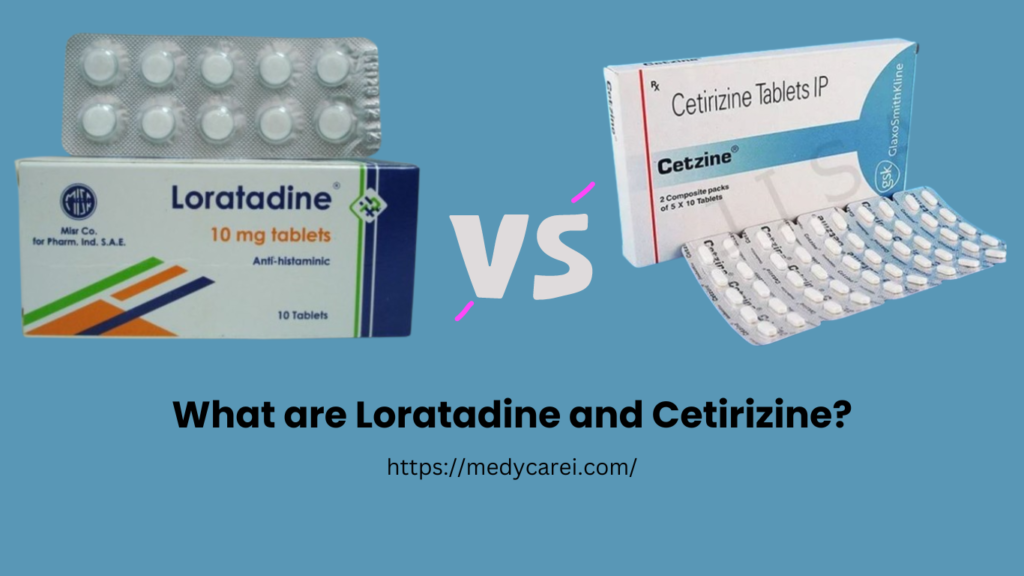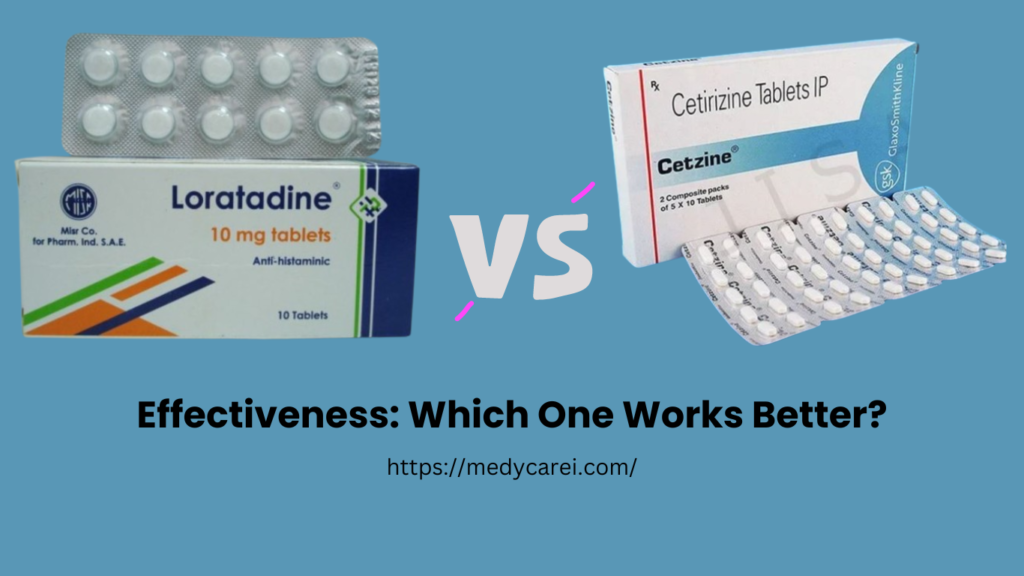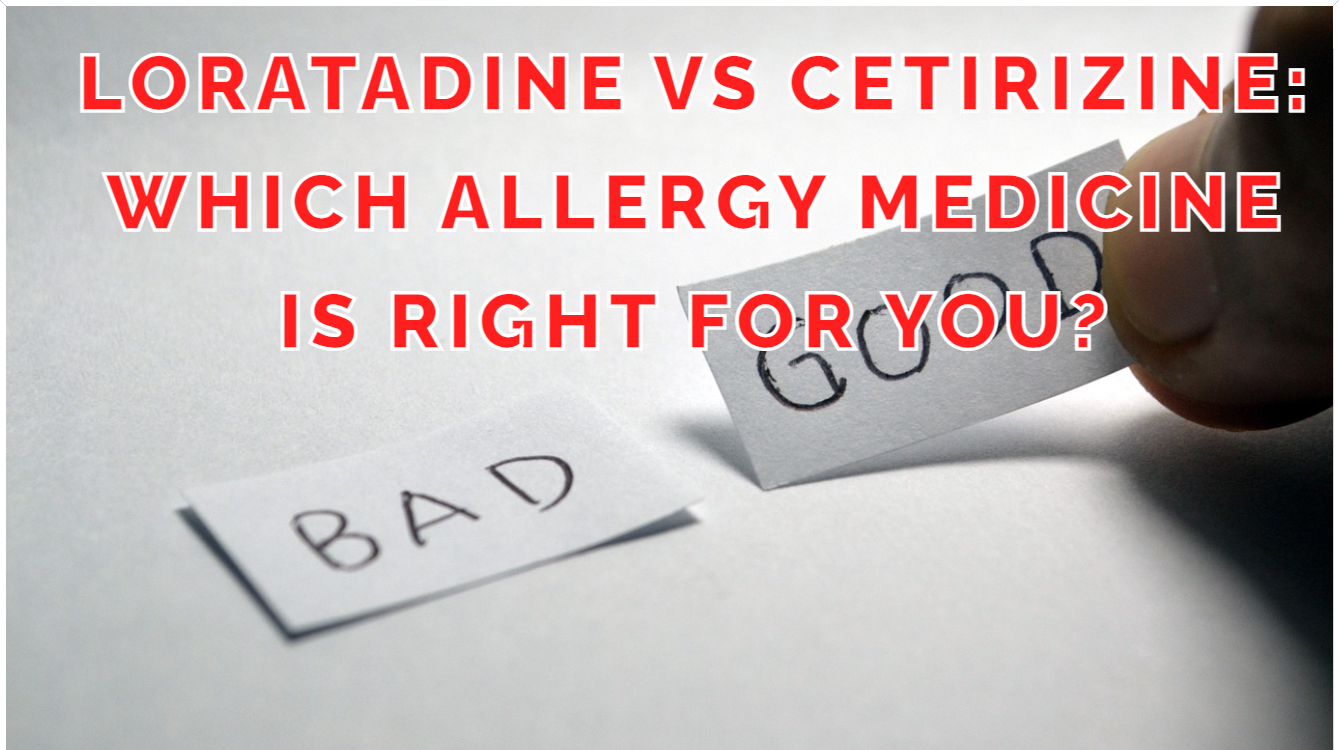Allergies, huh? They just creep up and attack when you’re least prepared. One minute, you’re just enjoying the day—spring or otherwise—the next, you’re having sneezing competitions like it’s part of the Olympic Games. Just before you run and start hoarding all of the tissue you can find, let’s first talk about two of the most popular over-the-counter medications that might be your only hope: Loratadine and Cetirizine. Who do you have to call? Fasten your seatbelt, folks, as we go on a ride to clear those allergies!
What are Loratadine and Cetirizine?

Before we really get technical with the differences between loratadine vs cetirizine, what are these two? In simpler terms, both loratadine and cetirizine are kinds of antihistamines, which is just another way to say that they help to block an allergy symptom in the form of histamines in your body.
Loratadine is also called Claritin and is considered a second-generation antihistamine. In other words, it was designed to not cause as much drowsiness compared with older, first-generation antihistamines like Benadryl. Cetirizine, in fact, is also a second-generation antihistamine and is known by its brand name Zyrtec.
So, standing in that pharmacy aisle asking yourself, “Loratadine or Cetirizine?”—you’re not alone. Let’s clarify what makes them different.
How Do They Work?
Both loratadine and cetirizine work by blocking histamines, but they do it in slightly different ways. If your body knows something to be allergic to—like pollen, pet dander, or that mysterious cloud of dust in your closet—it releases histamines. These bind to receptors in your body, and therein lies that annoying allergy.
Now, here come Loratadine and Cetirizine, the bouncers at the club. What they do is block histamines from those receptors. But this is where it gets interesting—Cetirizine is a bit more aggressive in the job. It has an increased affinity for the receptors, which probably has to do with why it would be more useful for those with really severe reactions to allergens. This, in turn, means more drowsiness is likely.
Fun Fact: If histamines were a rock band then Loratadine would be the roadie who gingerly takes their guitars away and Cetirizine would be the security guard who tackles them off stage.
Effectiveness: Which One Works Better?

Okay, effectiveness is really what you want to know, isn’t it? In the legendary Loratadine vs Cetirizine fight, which one should you bet on?
Loratadine is well known to be a bit mellower. It works against mild to moderate allergic symptoms and ingestion is less likely to put you in the mood for a nap just after taking it. This makes it a good choice if you need to be on the ball and moving—like on a workday or when you try to watch a movie without falling asleep halfway through.
The heavy hitter, on the other hand, is cetirizine. It’s stronger against big allergy symptoms and tends to kick in a bit quicker. It does come with a slightly higher chance of making you drowsy. So, if you are experiencing the full brunt of an allergy attack and don’t mind the possibility of a mid-afternoon snooze, that might be just your ticket.
Pro Tip: If you’re preparing for a big presentation at work, maybe don’t take Cetirizine that morning—unless, of course, you intend to show your colleagues how to take a nap at your desk.
Side Effects: The Good, the Bad, and the Sleepy
Nowadays, no medicine comes completely devoid of its side effects, and the same holds true for Loratadine and Cetirizine, which though usually well-tolerated, have a few things that should be kept in mind.
Side Effects of Loratadine:
- Headache
- Dry mouth
- Nervousness
- Stomach pain
Side Effects of Cetirizine:
- The most common complaint involves drowsiness.
- Dry mouth
- Dizziness
- Fatigue
In the loratadine vs cetirizine debate, if you can’t consume something without feeling sleepy, go for loratadine. On the other hand, will it make a person a big difference in an overarching manner, if you are a power napper of sorts, who is pretentious about it, you would still go for cetirizine, and the ways of it would compensate for its sleepy side effect.
Fun Line: If Loratadine and Cetirizine were characters in a movie, then Loratadine might be the one trusted companion who is always available to help with the least amount of drama, while Cetirizine would be the hero, super effective in its mission but sometimes requiring a nap after saving the day.
Duration of Action
Both Loratadine and Cetirizine are designed to be administered every 24 hours, meaning they can be taken once daily. This is great news for those of us who can barely remember to take their daily vitamin, let alone multiple doses of allergy medication.
However, some users find that Cetirizine’s effects are stronger, which can be an enormous positive if you are experiencing an allergy meltdown and want relief ten minutes ago. On the other hand, Loratadine is appreciated for the predictability of not subjecting you to a wild ride of drowsiness.
Which One Lasts Longer? On the basis of period-over-24-hour effectiveness, they are truly pretty much neck and neck. All comes down to how your body reacts to each.
Price and Availability
Cost-wise, Loradadine and Cetirizine approximate each other because they are available in their generic forms. Both can be found in most pharmacies at quite the same price. If you are about to run out of your budget, you may opt to look at the store brand, which will actually have the same effects like the name brand.
Punch Line: Deciding which one to take considering the cost of Loratadine or Cetirizine is like deciding between two types of bottled water brands. They both do the job, and the difference is in most cases about the label.
Which One Should You Choose (loratadine vs cetirizine)?
So, after all this discussion about loratadine vs cetirizine, which one should you choose? Well, it depends upon what you are going to do.
- Get Loratadine if you have mild or moderate allergies, need to stay awake and alert, and prefer a medication with fewer side effects.
- Go for Cetirizine if your allergies are more severe, you need quick relief, and you don’t mind getting a bit drowsy in exchange for much better control of symptoms.
Ultimately, however, both can be effective in equal measure, and you may, in fact, find alternating between the two depending on your symptoms is what you respond to best. Do talk with your physician or pharmacist, too, especially if there are other health issues with which you are dealing and might be taken care of with medication, too.
Concluding Thoughts
Allergies don’t have to ruin your day. Get the right medication and you will keep those sneezes, sniffles, and itches at bay. In fact, hat itches and the part itching you will be in good hands—team Loratadine or team Cetirizine. What is important, though, is that everybody’s body reacts differently, so it could be a little bit of trial and error for the perfect match.
Related Topic : Expert Tips for the Best Results on Cetirizine Allergy Dosage
Humorous Wrap-Up: Think about Loratadine and Cetirizine as two superheroes: Loratadine is the one who is very much intact, quite stable, and timely; Cetirizine is the mighty one, a little unpredictable, but after saving the day, he might want to take a nap. Whichever hero you pick, your allergies will stand no chance!
Disclaimer
The information provided on this blog regarding medicine prices and side effects is solely based on data collected from public domains. I am not a doctor or medical professional. While I strive to provide accurate and up-to-date information, I cannot guarantee the absolute accuracy or completeness of the data. It is always recommended to consult with a qualified healthcare professional or doctor for personalized medical advice and information. The content on this blog should not assume any responsibility for any consequences arising from the use of the information on this blog.
Thank you.
